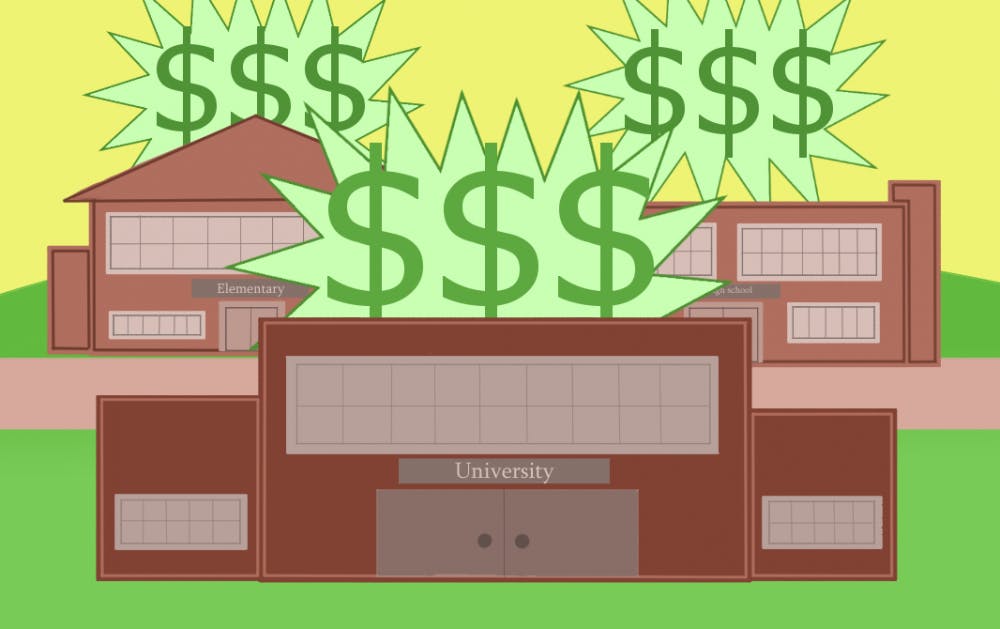Two bills recently introduced in the Arizona state legislature would work together to increase funding for primary, secondary and postsecondary education in Arizona.
Senate Bill 1345 and Senate Concurrent Resolution 1011 would increase funding for education by amending the Arizona constitution through a popular vote.
SCR 1011 includes the language that would appear on the ballot in the 2020 election, while SB 1345 includes additional details about how the amendment will be enacted.
Republican senator Kate Brophy McGee (LD-28), the primary sponsor of the bills, said the proposed amendment would change the current amount of sales tax allocated to education funding from .6 of a cent per dollar of sales tax paid to a full cent per dollar.
According to the language of the bill, 70 percent of the funding would go to primary and secondary education, 20 percent would go toward maintaining the in-state tuition rate and for technology and research initiatives, five percent would go to community college trade and workforce development programs and the rest would be dedicated to oversight and accountability.
Within the funds going toward higher education, 34 percent of the money is tagged for the technology and research initiative fund, which uses tax revenue to pay for research and workforce development in the sciences.
The other 66 percent would go to maintaining in-state tuition at current levels at Arizona's three public universities. The Arizona Board of Regents is to distribute the money proportionally among the universities based on the number of students they have who pay in-state tuition.
The new bill would essentially modify Proposition 301, which Arizona voters passed in 2000. The initiative increased the sales tax from five percent to 5.6 percent in order to boost education funding.
SB 1390 was passed last year, sponsored by Brophy McGee, extending Prop 301 funding for another 20 years — the original proposition was set to expire in 2021.
Brophy McGee said she is currently pushing her new bill and the accompanying amendment because she wants increased funding for schools while empowering voters through a ballot initiative.
Republican Senator Heather Carter (LD-15), a co-sponsor of the bills, said that the voters "were part of the original implementation of this funding source, so it's perfectly appropriate to go back and ask them, 'do we want to add to this funding source in the next iteration?'"
The Arizona Board of Regents has publicly stated that it supports both pieces of legislation.
Ron Shoopman, the chair of the board, said the regents appreciate the effort to support education in Arizona.
“It is nice to have some of our senior legislators looking at a way to add resources not only to higher ed but to the education pipeline in the state,” Shoopman said.
He said that the board is always open to communicating with lawmakers on education bills.
Brophy McGee said the purpose of specifically allocating money for in-state tuition is to help Arizona achieve its 50-50 goal for tuition funding, which stipulates that the state provide funding for 50 percent of in-state tuition and ABOR provide the other half.
Brophy McGee and Shoopman said the state currently funds a little more than 30 percent of in-state tuition. Shoopman said the 50-50 model is a relatively recent goal the legislature is trying to reach with the state.
“For years there was a formula that the state funded the universities with,” Shoopman said. “During the recession they weren’t able to do that, so the formula sort of went by the wayside.”
If the bill and resolution pass through the legislature, they will be put on the next general election ballot in 2020. If voters confirm the amendment, the increased tax will take effect in 2021.
Reach the reporter at mzhao49@asu.edu and follow @michelle_zhao23 on Twitter.
Like The State Press on Facebook and follow @statepress on Twitter.




